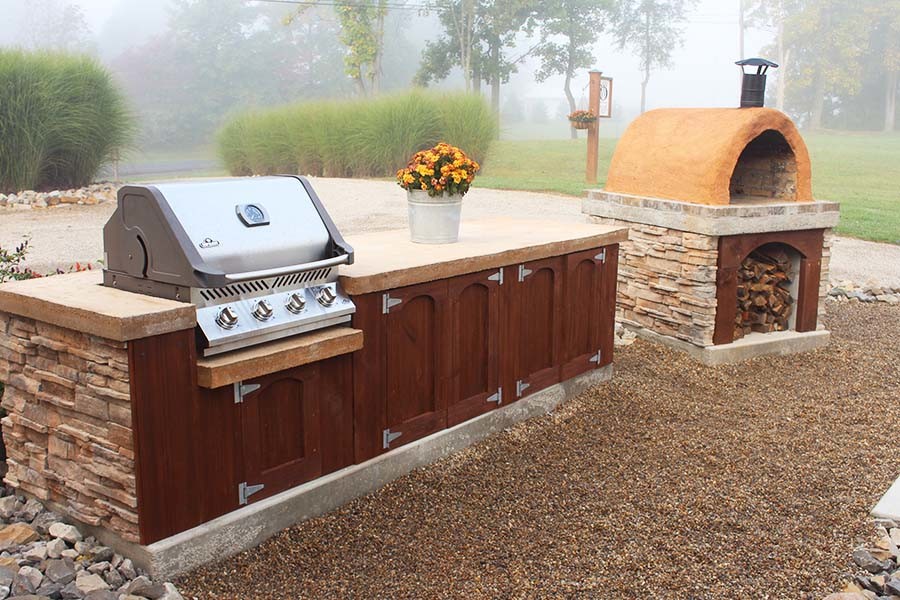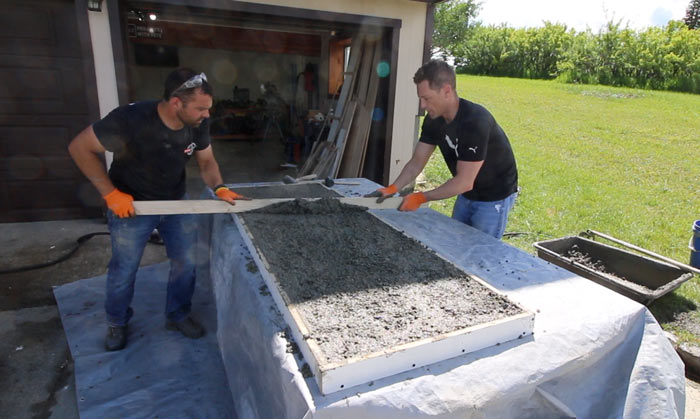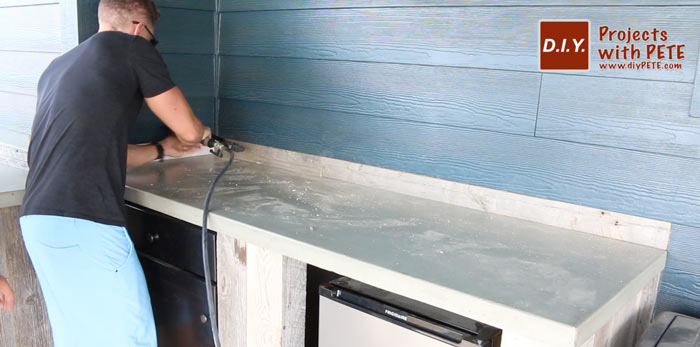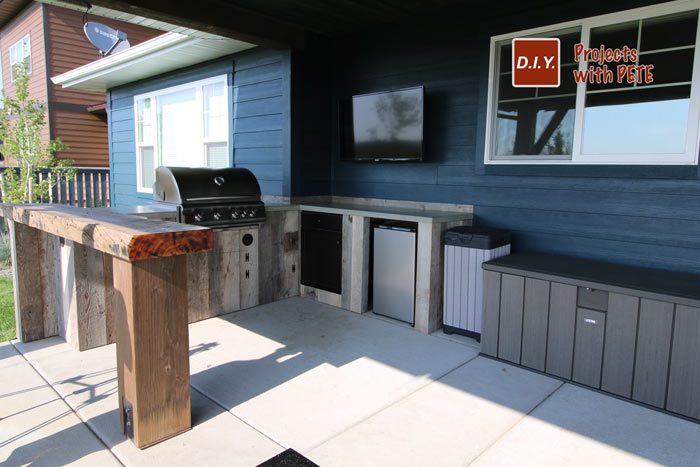Crafting Durable Outdoor Elegance
Concrete countertops are a popular choice for outdoor kitchens due to their durability, versatility, and aesthetic appeal. With the right materials and techniques, you can create custom concrete countertops that withstand the elements and enhance the beauty of your outdoor living space. In this guide, we’ll walk you through the process of making concrete countertops for outdoor kitchens, from planning and preparation to casting and finishing.
Planning and Preparation
Before you begin making concrete countertops for your outdoor kitchen, it’s essential to carefully plan and prepare for the project. Start by measuring the dimensions of your outdoor kitchen area to determine the size and shape of the countertops. Consider factors such as the layout of the space, the placement of appliances and fixtures, and any special features or design elements you want to incorporate.
Next, select a suitable location for casting the countertops, preferably in a well-ventilated outdoor area with ample space to work. Prepare the casting surface by covering it with plastic sheeting or a release agent to prevent the concrete from sticking.
Gather all the necessary materials and tools for the project, including concrete mix, reinforcement materials such as rebar or wire mesh, mold forms, a concrete mixer or mixing tools, and finishing supplies such as trowels and sealant.

Casting the Countertops
Once you’ve prepared the casting surface and gathered your materials, it’s time to mix and pour the concrete for the countertops. Follow the manufacturer’s instructions for mixing the concrete mix, ensuring it reaches the proper consistency for casting.
Pour the mixed concrete into the mold forms, filling them to the desired thickness for the countertops. Use a trowel or screed to level the concrete and remove any air bubbles or voids. If using reinforcement materials such as rebar or wire mesh, place them in the concrete while it’s still wet to provide added strength and stability.
After pouring the concrete, allow it to cure and harden according to the manufacturer’s recommendations. This typically involves covering the countertops with plastic sheeting or damp cloths to retain moisture and promote proper curing. Depending on the specific concrete mix used, curing times may vary, so be sure to follow the instructions closely.

Finishing and Sealing
Once the concrete countertops have cured and hardened, it’s time to remove them from the mold forms and finish them to achieve the desired look and texture. Use sandpaper or a concrete grinder to smooth out any rough edges or imperfections, taking care to maintain the shape and dimensions of the countertops.
Next, apply a concrete sealer to protect the countertops from moisture, stains, and UV damage. Choose a sealer specifically formulated for use on outdoor concrete surfaces and follow the manufacturer’s instructions for application. Multiple coats may be necessary to ensure thorough coverage and maximum protection.
After applying the sealer, allow it to dry completely before installing the countertops in your outdoor kitchen. Once installed, regularly clean and maintain the countertops according to the manufacturer’s recommendations to preserve their appearance and durability over time.

Customization and Design
One of the benefits of making concrete countertops for outdoor kitchens is the ability to customize them to suit your design preferences and style. Concrete can be tinted or stained to achieve a wide range of colors and finishes, from natural stone to modern minimalist designs.
In addition to color, you can also incorporate decorative elements such as embedded objects, aggregates, or textured finishes to add visual interest and personality to your countertops. Consider incorporating features such as integrated sinks, drainboards, or built-in appliances to enhance the functionality and usability of your outdoor kitchen space.
With careful planning and attention to detail, you can create custom concrete countertops that not only withstand the elements but also enhance the beauty and functionality of your outdoor kitchen for years to come.

Common Mistakes to Avoid:
Inadequate reinforcement: Failure to use sufficient reinforcement materials such as rebar or wire mesh can result in cracking or structural instability.
Improper mixing: Incorrectly mixing the concrete can lead to weak or inconsistent countertops that are prone to cracking or crumbling.
Insufficient curing time: Rushing the curing process can result in weak or brittle countertops that are susceptible to damage.
Overlooking proper sealing: Neglecting to seal the countertops can leave them vulnerable to stains, moisture damage, and UV exposure.
Ignoring maintenance: Failing to clean and maintain the countertops regularly can result in discoloration, staining, or deterioration over time.

Can concrete countertops withstand outdoor elements like rain and sun?
Yes, properly sealed and maintained concrete countertops are durable enough to withstand outdoor elements such as rain, sun, and temperature fluctuations. However, regular maintenance and sealing are essential to protect them from damage and ensure longevity.
How thick should concrete countertops be for outdoor use?
Concrete countertops for outdoor use typically range from 1.5 to 2 inches thick to provide adequate strength and durability. Thicker countertops may be necessary for larger or more heavily used outdoor kitchens.
Can I install concrete countertops myself, or do I need to hire a professional?
DIY installation of concrete countertops is possible with proper planning, preparation, and attention to detail. However, it’s essential to have some experience with concrete work and to follow best practices for mixing, pouring, and finishing to ensure a successful outcome. If you’re unsure or uncomfortable with the process, hiring a professional may be a better option.
Are concrete countertops prone to cracking?
While properly reinforced and cured concrete countertops are less prone to cracking, they can still develop hairline cracks over time due to settling, temperature changes, or other factors. Regular maintenance and proper sealing can help minimize the risk of cracking and extend the lifespan of the countertops.
How do I clean and maintain concrete countertops for outdoor kitchens?
To clean concrete countertops, use a mild detergent and warm water, avoiding harsh or abrasive cleaners that can damage the sealant. Periodically reapply a concrete sealer to protect the countertops from moisture, stains, and UV damage. Additionally, avoid placing hot pans or dishes directly on the countertops, as extreme heat can damage the sealant and cause discoloration.

How to Make Concrete Counters for an Outdoor Kitchen – DIY Pete

DIY Outdoor Kitchen Part 3: The Finishing Touches and Copper – Nor

Outdoor Kitchen With Concrete Countertops : 8 Steps (with Pictures

How to Make Concrete Counters for an Outdoor Kitchen – DIY Pete

Concrete Countertops For Outdoor Kitchens

Related articles:
- Concrete Countertop Stain Removal
- How To Stain A Concrete Countertop
- Concrete Countertop Overlay DIY
- Epoxy Finish For Concrete Countertops
- Concrete Countertops With Farmhouse Sink
- Concrete Countertop Design Ideas
- How To Acid Stain Concrete Countertops
- Concrete Countertop Reinforcement
- How To Build Concrete Countertop In Place
- Concrete Countertops Outdoor